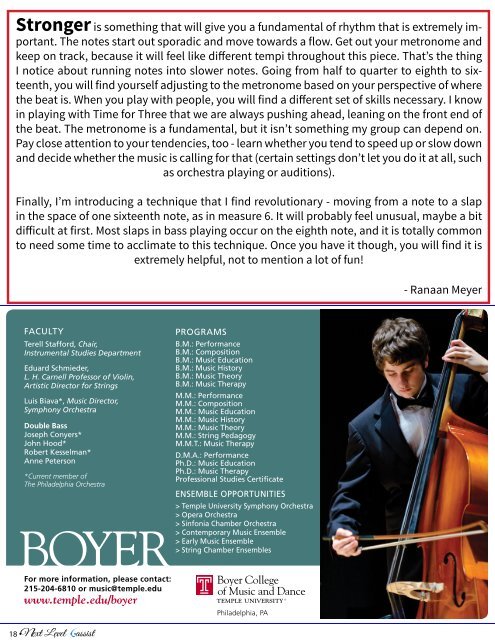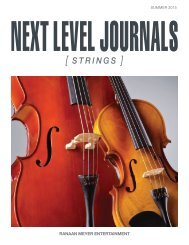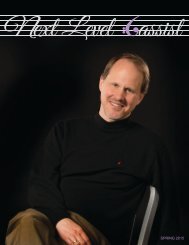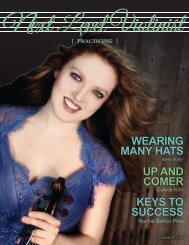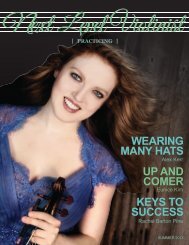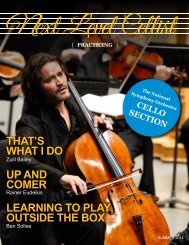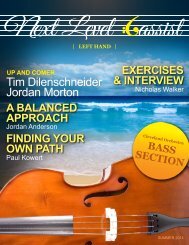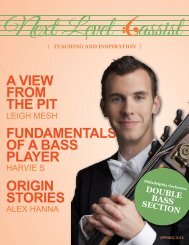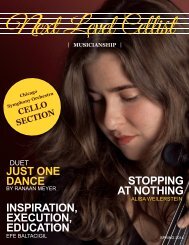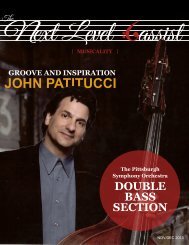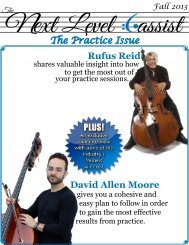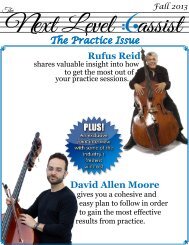The Next Level Bassist - Practicing
Articles by David Allen Moore and Rufus Reid, interviews with recent audition winners, free sheet music by Ranaan Meyer, and more!
Articles by David Allen Moore and Rufus Reid, interviews with recent audition winners, free sheet music by Ranaan Meyer, and more!
You also want an ePaper? Increase the reach of your titles
YUMPU automatically turns print PDFs into web optimized ePapers that Google loves.
Stronger is something that will give you a fundamental of rhythm that is extremely important.<br />
<strong>The</strong> notes start out sporadic and move towards a flow. Get out your metronome and<br />
keep on track, because it will feel like different tempi throughout this piece. That’s the thing<br />
I notice about running notes into slower notes. Going from half to quarter to eighth to sixteenth,<br />
you will find yourself adjusting to the metronome based on your perspective of where<br />
the beat is. When you play with people, you will find a different set of skills necessary. I know<br />
in playing with Time for Three that we are always pushing ahead, leaning on the front end of<br />
the beat. <strong>The</strong> metronome is a fundamental, but it isn’t something my group can depend on.<br />
Pay close attention to your tendencies, too - learn whether you tend to speed up or slow down<br />
and decide whether the music is calling for that (certain settings don’t let you do it at all, such<br />
as orchestra playing or auditions).<br />
Finally, I’m introducing a technique that I find revolutionary - moving from a note to a slap<br />
in the space of one sixteenth note, as in measure 6. It will probably feel unusual, maybe a bit<br />
difficult at first. Most slaps in bass playing occur on the eighth note, and it is totally common<br />
to need some time to acclimate to this technique. Once you have it though, you will find it is<br />
extremely helpful, not to mention a lot of fun!<br />
Faculty<br />
terell Stafford, Chair,<br />
Instrumental Studies Department<br />
Eduard Schmieder,<br />
L. H. Carnell Professor of Violin,<br />
Artistic Director for Strings<br />
luis Biava*, Music Director,<br />
Symphony Orchestra<br />
Double Bass<br />
Joseph conyers*<br />
John Hood*<br />
Robert Kesselman*<br />
anne Peterson<br />
*Current member of<br />
<strong>The</strong> Philadelphia Orchestra<br />
For more information, please contact:<br />
215-204-6810 or music@temple.edu<br />
www.temple.edu/boyer<br />
18 •<strong>Next</strong> <strong>Level</strong><br />
assist<br />
PRogRamS<br />
B.m.: Performance<br />
B.m.: composition<br />
B.m.: music Education<br />
B.m.: music History<br />
B.m.: music theory<br />
B.m.: music therapy<br />
m.m.: Performance<br />
m.m.: composition<br />
m.m.: music Education<br />
m.m.: music History<br />
m.m.: music theory<br />
m.m.: String Pedagogy<br />
m.m.t.: music therapy<br />
D.m.a.: Performance<br />
Ph.D.: music Education<br />
Ph.D.: music therapy<br />
Professional Studies certificate<br />
EnSEmBlE oPPoRtunitiES<br />
> temple university Symphony orchestra<br />
> opera orchestra<br />
> Sinfonia chamber orchestra<br />
> contemporary music Ensemble<br />
> Early music Ensemble<br />
> String chamber Ensembles<br />
Philadelphia, PA<br />
- Ranaan Meyer


